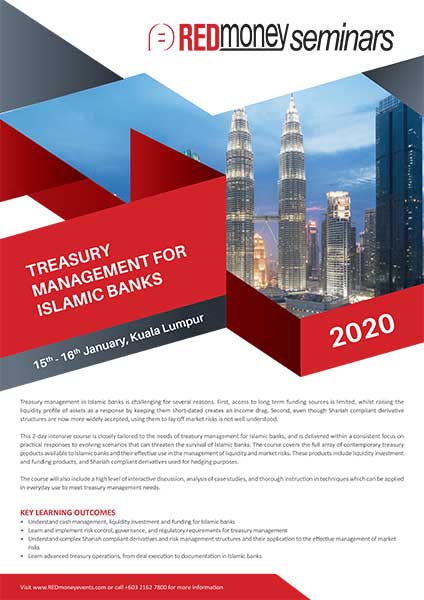
Course Background
Treasury management in Islamic banks is challenging for several reasons. First, access to long term funding sources is limited, whilst raising the liquidity profile of assets as a response by keeping them short-dated creates an income drag. Second, even though Shariah compliant derivative structures are now more widely accepted, using them to lay off market risks is not well understood.
This 2-day intensive course is closely tailored to the needs of treasury management for Islamic banks, and is delivered within a consistent focus on practical responses to evolving scenarios that can threaten the survival of Islamic banks. The course covers the full array of contemporary treasury products available to Islamic banks and their effective use in the management of liquidity and market risks. These products include liquidity investment and funding products, and Shariah compliant derivatives used for hedging purposes.
The course will also include a high level of interactive discussion, analysis of case studies, and thorough instruction in techniques which can be applied in everyday use to meet treasury management needs.
KEY LEARNING OUTCOMES
- Understand cash management, liquidity investment and funding for Islamic banks
- Learn and implement risk control, governance, and regulatory requirements for treasury management
- Understand complex Shariah compliant derivatives and risk management structures and their application to the effective management of market risks
- Learn advanced treasury operations, from deal execution to documentation in Islamic banks
Date: 15th & 16th January 2020
Venue: Kuala Lumpur
- Chief Risk Officers
- Chief Financial Officers
- Financial Risk Managers
- Treasury and ALM professionals
- Risk Analysts
- Financial Analysts
- Credit Managers
- Credit Portfolio Managers
- Asset Managers
- Corporate bankers
- Retail bankers
- Supervisors, regulators and risk standard setters
Early bird : RM 2,835
Early Bird: Registrations received on or before 12th December 2019, will receive a 10% discount. No discount shall be given to registrations received after this cut-off date.
Standard : RM3,150 per delegate
2 delegates (5% Discount) : RM2,995 per delegate
3 delegates (15% Discount) : RM2,680 per delegate
4 delegates (25% Discount) : RM2,365 per delegate
5 delegates (30% Discount) : RM2,205 per delegate
If you are looking for an in-house training program or wish to send a group to an existing public program, kindly please contact Andrew Tebbutt at [email protected] or +603 2162 7802.
Learn More
Kindly complete the registration form and email to [email protected] or fax +603 2162 7810
For enquiries please contact:
Normariya Sariman
Account Manager, REDmoney Seminars
[email protected]
Direct Line: +603 2162 7800 ext 44
Ramesh Kalimuthu
Events Sales Director
[email protected]
Direct Line: +603 2162 7800 ext 65
Fax: +603 2162 7810
For sponsorship & speaking opportunities:
Andrew Tebbutt
Managing Director
[email protected]
Direct Line: +603 2162 7802
For marketing and media enquiries
Govina Selvanthran
Marketing Manager
[email protected]
Direct Line: +603 2162 7800 ext 22

Date: 15th & 16th January 2020
Venue: Kuala Lumpur
- Chief Risk Officers
- Chief Financial Officers
- Financial Risk Managers
- Treasury and ALM professionals
- Risk Analysts
- Financial Analysts
- Credit Managers
- Credit Portfolio Managers
- Asset Managers
- Corporate bankers
- Retail bankers
- Supervisors, regulators and risk standard setters
Early bird : RM 2,835
Early Bird: Registrations received on or before 12th December 2019, will receive a 10% discount. No discount shall be given to registrations received after this cut-off date.
Standard : RM3,150 per delegate
2 delegates (5% Discount) : RM2,995 per delegate
3 delegates (15% Discount) : RM2,680 per delegate
4 delegates (25% Discount) : RM2,365 per delegate
5 delegates (30% Discount) : RM2,205 per delegate
If you are looking for an in-house training program or wish to send a group to an existing public program, kindly please contact Andrew Tebbutt at [email protected] or +603 2162 7802./p>
Kindly complete the registration form and email to [email protected] or fax +603 2162 7810
Course Background
Treasury management in Islamic banks is challenging for several reasons. First, access to long term funding sources is limited, whilst raising the liquidity profile of assets as a response by keeping them short-dated creates an income drag. Second, even though Shariah compliant derivative structures are now more widely accepted, using them to lay off market risks is not well understood.
This 2-day intensive course is closely tailored to the needs of treasury management for Islamic banks, and is delivered within a consistent focus on practical responses to evolving scenarios that can threaten the survival of Islamic banks. The course covers the full array of contemporary treasury products available to Islamic banks and their effective use in the management of liquidity and market risks. These products include liquidity investment and funding products, and Shariah compliant derivatives used for hedging purposes.
The course will also include a high level of interactive discussion, analysis of case studies, and thorough instruction in techniques which can be applied in everyday use to meet treasury management needs.
KEY LEARNING OUTCOMES
- Understand cash management, liquidity investment and funding for Islamic banks
- Learn and implement risk control, governance, and regulatory requirements for treasury management
- Understand complex Shariah compliant derivatives and risk management structures and their application to the effective management of market risks
- Learn advanced treasury operations, from deal execution to documentation in Islamic banks
Seminar Agenda
- Treasury objectives
- Funding the bank
- Cash management and investing surplus liquidity
- Market risk management - Foreign exchange and interest rates
- Treasury governance
- ALCO and gap analysis
- Treasury limits structure
- Limits setting process
- Breaches, escalations and resolutions
- Treasury Shariah audit
- Relevant regulatory requirements for Islamic treasuries
- Interest rate risk in the banking book (IRBBB)
- Liquid assets and Net stable funding ratios
- High quality liquid assets and Sukuk eligibility
- Core deposits as a stable source of funding
- Current, savings and profit-sharing investment accounts
- Relevance and importance of deposit insurance to Islamic banks
- Short-term funding – interbank money market
- Products – Murabahah, Wakalah
- Pricing – importance of currency peg to US dollar
- Restrictions on commodities
- Long-term funding products – fixed income market
- Sukuk Products
- Types of Sukuk
- Choice of rate fixing and maturity
- Additional Tier 1 equity
- Sukuk Products
-
- Sukuk pricing – understanding the swaps curve and credit ratings
- Characteristics of the Sukuk market
- Sukuk issuance process and the role of treasury
- Inter-bank money market placement
- Investment funds and syndicated Murabahah
- Trading in Sukuk for treasury management purposes
- Stability and sustainability of funding sources
- Liquid assets buffer: amount and choice of liquid assets; portfolio management
- Scenarios and back-testing
- Stress-testing liquidity
- Contingency planning and lender of last resort for Islamic banks
- Key metrics: Cash forecast, roll-off forecast, liquidity forecast, concentrations
- Arcapita Bank
- Northern Rock
- Shariah compliant contracts for structuring Islamic derivatives
- Waad
- Murabahah
- Applications of Waad and Murabahah
- FX forwards
- Profit rate swaps
- Currency swaps
- FX and interest rate options
- How to use Islamic derivatives for FX exposures
- Measuring FX risk: from nominal exposure to Value-at-Risk
- Mitigating FX exposures with Islamic derivatives
- How to use Islamic derivatives for interest rate risk exposures
- Measuring interest rate risk: earnings at risk
- Mitigating interest rate risk with Islamic derivatives
- Other uses for Islamic derivatives
- Commodity and equity linked notes for investment and funding
- Latest developments in the structuring and use of Shariah compliant derivatives
- Practical challenges to overcome in using Islamic derivatives
Group Discussion: Deutsche Bank’s white paper on Islamic derivatives
- Treasury limits and delegated authorities
- Liquidity and FX deal management
- Procedural requirements, control, conditions of use
- Shariah requirement for dealing with late payments
- Dealing with brokers
- Settlement and confirmation
- Back-to-back deals and netting arrangements
- Reducing operational risk
- Treasury placement - MATP
- Islamic derivatives
- Documentation - ISDA, IIFM Master Agreement
- Valuation and collateral management
Seminar Speaker

Dr Ken Baldwin
Former Director Financial Policies & Planning, Islamic Development Bank
Dr. Ken Baldwin has worked as a practitioner in banking and finance for over 25 years in senior positions spanning the front and middle offices. Having graduated from Oxford University with a first-class honors degree in Physics in 1989, he qualified as a Chartered Accountant with PWC, before joining UBS, and then later Credit Suisse, in derivatives risk and control functions based in London.
He gained a PhD in the microeconomic theory of risk sharing in Islamic contracts, and worked in the GCC for 15 years in Islamic retail and Islamic investment banks. Whilst at Abu Dhabi Islamic Bank, Dr. Ken built an ALM analytic technology platform capable of capturing liquidity and interest rate risks inherent in the many varied Islamic financing products used at retail and corporate levels. He then moved to take up the position of MENA Regional Head of Quantitative Analysis for Citigroup. At Citicorp, Dr. Ken worked on structuring complex products used by Gulf-regional corporations to hedge FX and interest risks. Still residing in Bahrain, Dr. Ken then joined Investcorp, where he worked on the risk due diligence of corporate private equity and real estate private equity transactions and portfolio management. After leaving Investcorp, he set up the risk management department for venture capital bank, providing Basel III compliance and deal analysis for the bank. He then operationalized a new Islamic investment bank as its Chief Operating Officer for 3 years, before his most recent industry role at the Islamic Development Bank, where he set up and ran a new department tasked with developing Financial Policies and Planning underpinned by robust financial analytic tools and methodologies designed specifically for the IDB. Dr. Ken is currently a senior university lecturer in finance in the UK. He has published quantitative finance articles in peer-reviewed academic journals including the Journal of Risk, and during his earlier career, taught CFA and FRM professional certifications as a pastime for the Bahrain Institute of Banking and Finance.
Ken is a British Muslim.
For enquiries please contact:
Normariya Sariman
Account Manager, REDmoney Seminars
[email protected]
Direct Line: +603 2162 7800 ext 44
Ramesh Kalimuthu
Events Sales Director
[email protected]
Direct Line: +603 2162 7800 ext 65
Fax: +603 2162 7810
For sponsorship & speaking opportunities:
Andrew Tebbutt
Managing Director
[email protected]
Direct Line: +603 2162 7802
For marketing and media enquiries
Govina Selvanthran
Marketing Manager
[email protected]
Direct Line: +603 2162 7800 ext 22

 Treasury Management for Islamic Banks
Treasury Management for Islamic Banks